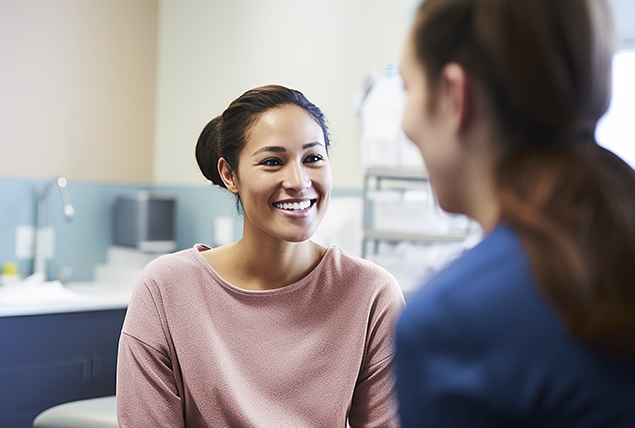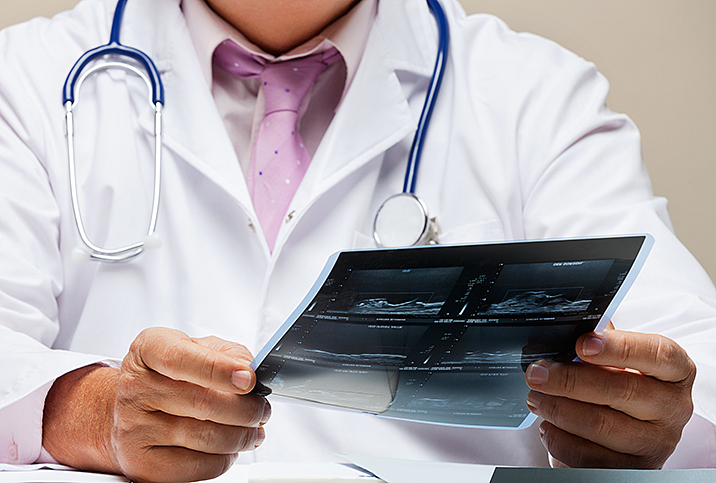Pregnant? Here's What to Expect From Your First OB-GYN Appointment

Finding out you're pregnant is a lot to take in, especially if it's your first pregnancy. Once the excitement settles, you may wonder about your next steps, such as when you should see a doctor and what you should expect during the first OB-GYN appointment.
When should you book your first OB-GYN appointment?
You may be tempted to book an appointment as soon as you see the two lines on the pregnancy test. The best time to schedule your appointment, though, is approximately eight weeks after the first day of your last menstrual cycle, according to Nicole Sparks, M.D., a board-certified OB-GYN at the Howard Center for Women's Health with locations around Georgia.
"If you book an appointment too early, we may not see a heartbeat," she said. "We are able to first detect a fetal heartbeat with a transvaginal ultrasound at approximately six weeks of gestation but can be better assessed when you are a little farther along."
But it's OK to book an appointment sooner if you have any concerns or have a history of irregular periods or ectopic pregnancies.
What should you wear to your first OB-GYN appointment?
Your first OB-GYN appointment may involve multiple exams. You may want to skip the dress, romper or one-piece pants suit. Think comfort. Your doctor may want to perform a complete physical exam.
If you wear a two-piece outfit, you can keep your top on during your vaginal exam. Skip the button-up shirts and strappy sandals. Opt for slip-on shoes so you can quickly step out of them when you hop on the scale or disrobe.
What should you expect during your first OB-GYN appointment?
If you've visited the gynecologist's office before, you already have a rough idea of what to expect. Your first OB-GYN appointment is similar, though it may run a bit longer than usual.
You should anticipate participating in five activities during your first OB-GYN appointment. Knowing some good questions will help you and your doctor plan for the months to come. Sparks and Hack recommend some good questions to ask.
1. Discuss medical history
Do you currently take any medication? Do you have existing medical conditions? Sometimes, our nerves or excitement get the best of us, and we forget all kinds of things. Take a list of your medical information. Don't forget to include your family health history and past surgeries.
If this isn't your first pregnancy, inform your provider about previous pregnancies (including ectopic ones, abortions, miscarriages and stillbirths). They'll want to know dates of birth, baby weights and any complications, said Stephanie Hack, M.D., an OB-GYN and the founder of Lady Parts Doctor, an informational resource for women's health in Washington, D.C.
Your doctor will use this information to take an informed approach to your pregnancy. It will help them know what to look for and what to track.
2. Ultrasound
Your first appointment may include an ultrasound—potentially transvaginal or abdominal—depending on how far along you are. This confirms the pregnancy and provides a more accurate due date.
Make sure you know the first day of your last period because that helps calculate your baby's due date.
3. Physical and pelvic exam
Like a visit to your regular medical provider, a prenatal appointment includes a physical exam that checks your blood pressure, height and weight.
"There will also be a pelvic exam and Pap smear if you're not up to date," Sparks said.
4. Blood work and urine sample
Be sure to drink water before your appointment because you'll need to provide a urine sample.
"Your sample will be checked for bacteria, protein and any infections," Sparks said.
You can expect to undergo a blood draw.
"We will also obtain blood work, including your hemoglobin, to check your iron levels, HIV, Rubella, Varicella and your blood type," she added. "Plus testing for sexually transmitted infections (STIs)."
5. Discuss symptoms and ask questions
What kind of symptoms have you had? Are you dealing with morning sickness or cravings? Your OB-GYN appointment gives you a chance to ask questions about anything you're concerned about or simply something you're interested in.
"Use this time to ask any general questions you have: pregnancy visit schedule, activities or foods you should avoid, medications that need to change, etcetera," Hack said.
Find a provider you trust and who listens to you. If you don't feel great about your first pregnancy appointment, shop around for a new OB-GYN.
Sparks suggested some other questions you may want to ask during your appointment:
- What exercise is safe during pregnancy?
- Which prenatal vitamins should I take?
- What are any warning signs to look out for?
- Do you recommend certain screening tests?
- What should my caffeine intake be during pregnancy?
- How much weight can I gain at this stage of pregnancy?
"Pregnancy is such a special time, but it can be filled with lots of anxiety because you don't know what to expect," Sparks said.
Arriving at your first appointment prepared with these and more questions can help alleviate anxiety, especially if this is your first pregnancy.
Schedule your next appointment
After you've attended your first OB-GYN appointment since finding out you're pregnant, what's next?
"Once your pregnancy is confirmed, the OB-GYN's office will likely schedule you for a follow-up appointment in four weeks," Sparks said. "You will see your provider once a month until the third trimester, and then appointments are every two weeks until 36 weeks."
Beginning at 36 weeks, you'll more than likely move to weekly visits.
"Once your baby gets big enough, you won't have an ultrasound every visit. Your doctor will listen to the baby's heartbeat with a device called a Doppler. And don't worry, you won't need a pelvic exam at every visit unless you're having complications," Sparks said.
Find a provider you trust and who listens to you. If you don't feel great about your first pregnancy appointment and feel your questions and concerns were dismissed or you were being rushed out the door, shop around for a new OB-GYN.
Don't delay in finding prenatal care that's going to work for you, though. Ask your friends and family for referrals until you find one you feel more comfortable with.
You should feel relaxed and confident during your prenatal visit. It's an important part of a healthy pregnancy.
Can my partner or spouse go to my first OB-GYN appointment with me?
Yes. Your partner, spouse or friend can attend your OB-GYN appointment with you.
There is typically an extra chair in the exam room for them, or, if you'd prefer, they can wait in the lobby until you are finished.
Hack had one last piece of advice for your pregnancy journey.
"Give yourself permission to be excited and happy," she said. "Enjoy the experience."


















